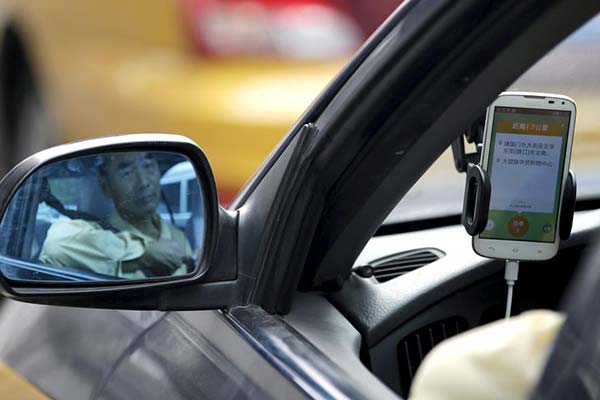 |
|
A taxi driver is reflected in a side mirror as he uses the Didi Chuxing car-hailing application in Beijing, September 22, 2015. [Photo/Agencies] |
Notice is first encouragement from government for car-hailing sector
A glimmer of hope may flare for ride-sharing companies in China to gain legitimacy and see further growth after Chinese ministries vowed to encourage the popular means of transport.
China "encourages orderly development of online car booking and ride-sharing", said a notice released by 10 ministerial-level departments including the National Development and Reform Commission on March 1.
The move is part of the nation's drive to encourage green consumption and marks the first time the Chinese government has given a clear, positive stance on ride-sharing in the form of legal documents.
Miao Wei, the minister of Industry and Information Technology, said at a news conference on Feb 25 that the ministry is "actively supportive" of online ride-sharing apps as they are something new in the age of the Internet that features sharing.
A month earlier, Wang Yongping, a department head at the Ministry of Transport, said his ministry supports people going home sharing a car during the Spring Festival as long as they are not profit driven.
Didi Kuaidi, the country's largest ride-sharing operator, told news portal sina.com that it is excited about the regulation and confident in the potential of online car-hailing services.
The company processes 7 million car-hailing orders on a daily basis in more than 400 Chinese cities. It saw an increase of 10 million customers in January.
Uber is following up. It has established an independent entity in China and plans to offer services in 100 Chinese cities in 2016.
Despite their burgeoning business and increasing popularity, ride-sharing companies in China including Didi Kuaidi and Uber have not won legitimacy.
Both were summoned by local governments several times in 2015 and told to obey Chinese laws. Law enforcement officials visited Uber's offices in several cities to investigate alleged illegal operations.
Local authorities in many cities including Beijing and Tianjin tightened their checks on car-hailing services and drivers of private cars faced punishment of up to 10,000 yuan ($1,535) for illegal operation around the Spring Festival holiday.
Although the regulation does not include any further details, industry insiders said it is an indicator that car-hailing app providers like Didi Kuaidi will see fewer obstacles in their development and related issues like passengers' insurance might become easier to solve.
